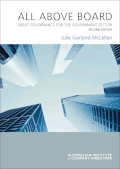|
|
|
|
|
|
|
|
|
Dear reader,
Welcome to the June 2021 edition of The Director’s Dilemma. Each month this newsletter looks at a real-life scenario that happened to a board, perhaps to a board like yours, and considers a range of responses. The scenarios are de-identified to protect the individuals concerned. This month we look at a complex relationship between a board and a committee.
Of course, these scenarios are general, written to help you with practical information without the risks that attach to living these situations in real-life. I work with boards and directors as a confidential mentor to help them build great companies and maximise their impact. If you would like personalised service please call me.
To read this email in a web browser, go to www.mclellan.com.au/newsletter.html and click on 'read the latest issue'. I hope you will enjoy the latest dilemma:
 Howard is a director on a government-owned company board. As the only accountant on the board he was asked to sit on the audit committee. The Board Chair is the other board member on the committee. The Audit Chair is an independent financial expert who has been appointed to the role to ensure that the board has independent leadership and advice from the committee. Howard is a director on a government-owned company board. As the only accountant on the board he was asked to sit on the audit committee. The Board Chair is the other board member on the committee. The Audit Chair is an independent financial expert who has been appointed to the role to ensure that the board has independent leadership and advice from the committee.
Unfortunately, because the Audit Chair doesn’t attend board meetings, he doesn’t always understand the context of items on the Audit Committee agenda. The Board Chair gets very impatient with the Audit Chair and she is occasionally quite rude and dismissive.
She has taken upon herself the role of keeping the board informed about issues the committee is considering. She has also started to usurp the role of the Audit Chair and run the audit committee meetings.
Management are feeling very vulnerable because they want to respect the Audit Chair, who sits on a number of other government committees and is generally well respected and liked. Management also want to please the Board Chair.
The CFO has asked Howard for advice on how to handle the situation which is starting to impact morale.
What can Howard do?
|
|
|
|
Murat Kaan's Answer

Howard is the only one to have a clear picture of the entire context. Therefore, the request of the CFO to Howard seems to be the right step.
The root cause of the problem is the fact that the Audit Committee Chair does not receive the necessary information about the activities of the Board. Therefore, a system which provides for informing of the Chair should be in place.
The Audit Committee Chair is accountable for providing advice to the Board. Therefore, the detailed minutes and decisions of the Board should be forwarded to the Chair, immediately after Board meetings.
It looks that the Board Chair is not against the Committee Chair; she only gets frustrated because the Audit Committee Chair does not fulfill his duties, as expected by the Board. On the other side, the Board members are aware that they should keep satisfied both, the Board Chair and the Committee Chair.
Therefore, it would be best if they could establish a mechanism which provides the close collaboration of both parts. It would be wise to organize 1:1 informal meetings, between both Chairs, where the Board Chair would clarify her expectations about the issues of the Board and, where the Committee Chair would provide his recommendations about these topics, on a friendly environment.
Murat Kaan Güneri is Managing Partner of AltoPartners Turkey and MKG & Partners. He is based in Istanbul, Turkey.
|
|
|
|
Julie's Answer
 This is a difficult situation driven by people who are in a complex relationship and reacting rather than carefully and thoughfully responding to the situation. There is likely to be some clear guidance on how committee members relate to committee chairs in policies about committees and governance. This applies even if the committee member is the board chair; respect should always be given. This is a difficult situation driven by people who are in a complex relationship and reacting rather than carefully and thoughfully responding to the situation. There is likely to be some clear guidance on how committee members relate to committee chairs in policies about committees and governance. This applies even if the committee member is the board chair; respect should always be given.
Independent audit committee members, who are not members of the board, are becoming common in the government-owned sector. They add value and give the shareholder confidence the board are not forming a view of the accounts or performance that might not be shared by a rational outsider. They also add complexity because standard governance practices do not easily accommodate this more distant relationship between boards and committees.
Howard should read the relevant committee and board charters, then check the legal framework and any guidance from government departments on how the relationships are supposed to operate. If there is nothing to prevent it, he could suggest some of the following:
-
The Audit Chair attend board meetings as an obseerver and report verbally to the board on audit committee activities
-
Howard takes on the Audit Chair role and the independent becomes 'just' a committee member
-
The Board Chair leaves the Audit Committee
-
Howard, or the Board Chair, brief the Audit Chair on issues at board level before each meeting
None of these will be a 'silver bullet'. If something is not done, the situation will get worse and positions will become entrenched.
Julie Garland McLellan is a non-executive director and board consultant based in Sydney, Australia.
|
|
|
|
Margaret's Answer
 Howard is faced with a dilemma. Howard is faced with a dilemma.
The Board has appointed an independent financial expert as the Audit Committee Chair for the purpose of receiving independent advice on matters handled by the Audit Committee. The Board Chair is becoming a road block for this to happen.
Howard needs to speak with the Board Chair to remind her of the purpose of the appointment of the independent Audit Chair by the Board and the importance the Board has put on the Audit Committee Chair's insights at board level.
I think a way going forward would be for Howard, in his discussion with the Board Chair, to also strongly encourage her to invite the Audit Committee Chair to attend the board meetings, at the appropriate time, to brief the board on all matters related to the Audit Committee. Pointing out to the Board Chair that this was the reason the Audit Committee Chair was appointed in the first place by the Board.
From another angle Howard could have a discussion with the Audit Committee Chair encouraging them to speak with the Board Chair regarding briefing the Board on Audit Committee related matters. I think if this was achieved the Board Chair would start behaving appropriately in the Audit Committee meetings and the Board would receive the benefit of the financial independent expertise of the Audit Committee Chair - thus solving Howard's Dilemma!
Margaret Walker is Chairman of Cystic Fibrosis Australia, Audit Committee Member of both The Institute of Marine Science and The Suburban Land Agency, and a director of Buderim Ginger. She is based in Brisbane, Australia.
|
|
|
|
Julie’s News
May was a quiet month. I really miss the days when I could list the events attended and the countries to which I travelled. However, I am now vaccinated and starting to hope for a return to globe trotting governance. In the interim I am providing courses for a range of international governance institutions using web-based technology.
Book Review - All Above Board by Julie Garland McLellan

With a foreword by the Hon Nick Greiner AC FAICDLife, eight chapters and 46 case studies, All Above Board is the must-have public sector handbook for emerging and aspiring directors, and a potent refresher for experienced board members.
All Above Board is your guide to public sector governance and includes sections on:
-
how governments work with their boards;
-
key differences between private and public sector boards;
-
ethics and conflicts;
-
risk management and strategic planning.
Available at AICD.
Inspirational quote for June

I often say that all directors should read science fiction. This quote is part of the reason why.
Do you know where to focus for maximum impact? – boards often struggle to get cut through and drive company performance. They work hard, then they work harder, then call in a consultant who recommends some changes, then they work harder still.
If that sounds like your board, don't worry. It is likely that you have simply been focusing on the wrong stuff. I have made a diagnostic tool that might help you to prioritise the actions that will free your board from the drudgery and allow you to maximise your impact. You can take the diagnostic here:
https://directorsdilemma.scoreapp.com
Call me afterwards for help with revitalising your board.
A note on names - A few readers have asked me where I find the names for the protagonists in each case study; I 'borrow' them from people I meet or things that I read. Howard is an English-language given name originating from Old English 'Hereward', meaning 'army guard', and Old Norse Hávarðr, which means "high guard". The modern Norwegian equivalent is Håvard. Our protagonist Howard will need to be vigilant and guard against any breakdown in relationships between the board and this important committee.
This newsletter - If you have any ideas for improving the newsletter please let me know. If you are reading a forwarded copy, please visit my website and sign up for your own subscription.
Suggestions for dilemmas - Thank you to all the readers who have suggested dilemmas. They are greatly appreciated. I will answer them all eventually. I could not write this newsletter without your help and without the generous help of all the experts who respond each month to the case studies.
Be a contributor - If you would like to attempt a response to the dilemmas for publication you will be most welcome. Simply reply to this email and let me know.
Let's connect - I use LinkedIn to share information about boards and directorship with my friends and acquaintances. If you use LinkedIn and we are not yet connected I will welcome a connection from you. You can find me at linkedin.com/in/juliegarlandmclellan.
Let me help you - I would be delighted to speak for or train your board, staff, audience and/or group. If I can help, please contact me at julie@mclellan.com.au.
Farewell until the next issue due 1 July 2021. I look forward to greeting you again then. In the interim I hope you will enjoy health, happiness and hard work.
Enjoy governing your companies!
Best regards,
Julie

Main Photo by cottonbro from Pexels
Quote Illustration by Keitchy Sanchez
Disclaimer:
The opinions expressed above are general in nature and are designed to help you to develop your judgement as a director. They are not a definitive legal ruling and do not constitute legal advice. Names and some circumstances in the case study have been changed to ensure anonymity. Contributors to this newsletter comment in the context of their own jurisdiction; readers should check their local laws and regulations as they may be very different.
Privacy: I am privileged to have your contact details and keep them as safely as possible. I will alert you if they are ever accessed by any unauthorised person (the technical staff at ayuda help with publishing and issuing the Director's Dilemma and have access so they can send the newsletters to you). I do not sell your details to anyone; they are kept only for the intended purpose - sending you this newsletter and helping to build the judgement of company directors by providing a safe way to consider potential responses to real life events.
|
|
|
|
|
|
|
 Howard is a director on a government-owned company board. As the only accountant on the board he was asked to sit on the audit committee. The Board Chair is the other board member on the committee. The Audit Chair is an independent financial expert who has been appointed to the role to ensure that the board has independent leadership and advice from the committee.
Howard is a director on a government-owned company board. As the only accountant on the board he was asked to sit on the audit committee. The Board Chair is the other board member on the committee. The Audit Chair is an independent financial expert who has been appointed to the role to ensure that the board has independent leadership and advice from the committee.

 This is a difficult situation driven by people who are in a complex relationship and reacting rather than carefully and thoughfully responding to the situation. There is likely to be some clear guidance on how committee members relate to committee chairs in policies about committees and governance. This applies even if the committee member is the board chair; respect should always be given.
This is a difficult situation driven by people who are in a complex relationship and reacting rather than carefully and thoughfully responding to the situation. There is likely to be some clear guidance on how committee members relate to committee chairs in policies about committees and governance. This applies even if the committee member is the board chair; respect should always be given. Howard is faced with a dilemma.
Howard is faced with a dilemma.

